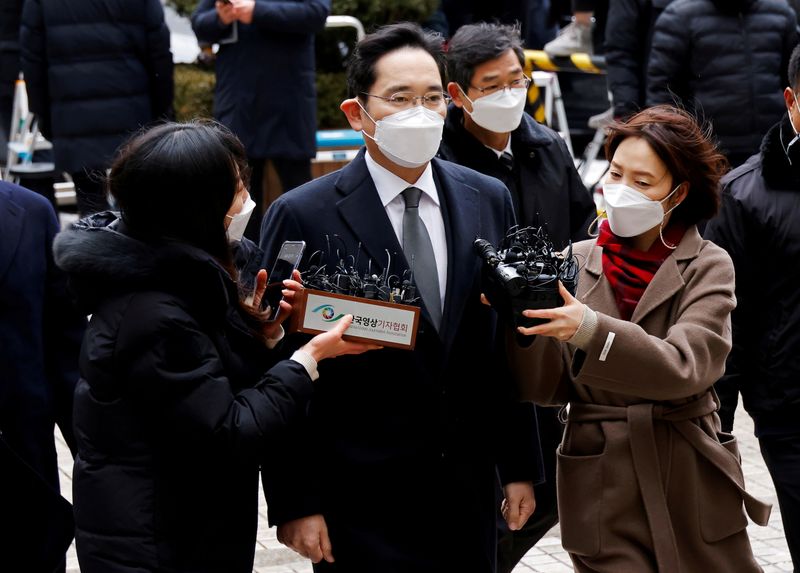By Joyce Lee
SEOUL (Reuters) -Samsung conglomerate chief Jay Y. Lee admitted in court on Tuesday to unlawful use of a controlled substance, as the executive's legal troubles continued despite his release on parole in August after a bribery conviction.
Lee appeared at the Seoul Central District Court where, in a short first hearing, he said he received propofol - a sedative used in anaesthesia - 41 times from 2015 through 2020.
His release in August had raised expectations of major decisions being taken at Samsung Electronics (OTC:SSNLF) Co Ltd and its affiliates, including the location of a $17 billion chip factory being planned in the United States.
Prosecutors, who are seeking a fine of 70 million won ($58,327) and an additional fee of 17 million won, said that Lee had been administered propofol under the guise of a skin treatment or unrelated to a legitimate treatment.
"This matter originated as for treatment, but I am deeply regretful," Lee said. "I will ... make sure that this does not happen again," Lee told the small court, where about 15 people were present, adding he had not used the drug since his release.
Lee's lawyer told the court that Lee had received treatment for medical purposes, originally due to psychological pressure after the hospitalisation of his father and then as a result of the graft scandal and trial leading to his January conviction.
The court ruling is scheduled for Oct 26.
Under South Korean law, the recipient of a controlled substance deemed to have been administered illegally is liable for prosecution, as well as those who administered the drug.
Staff at a clinic where Lee received the sedative, who are being tried separately, have denied wrongdoing.
Prosecutors were first made aware of the matter in 2020 but were advised to drop their investigation in March 2021 by an independent panel reviewing prosecution probes. They continued to seek a fine as recently as June before another police report of sedative use led the court to order a hearing.
As propofol is less likely to be misused than many other controlled substances, many similar cases of unlawful use have resulted in fines rather than jail terms.
Lee was convicted in January of bribery and embezzlement and sentenced to 30 months in jail - including a year served before his sentencing. He has kept a low profile since he was paroled in August, with the presidential office calling for public understanding, citing hope that he will help the country produce "semiconductors and vaccines".
After his release, Samsung (KS:005930) said it would invest 240 trillion won in the next three years in fields such as chips and biopharmaceuticals.

Lee is simultaneously on trial accused of stock-price manipulation and accounting fraud related to the $8 billion merger of two Samsung firms in 2015.
($1 = 1,200.1400 won)